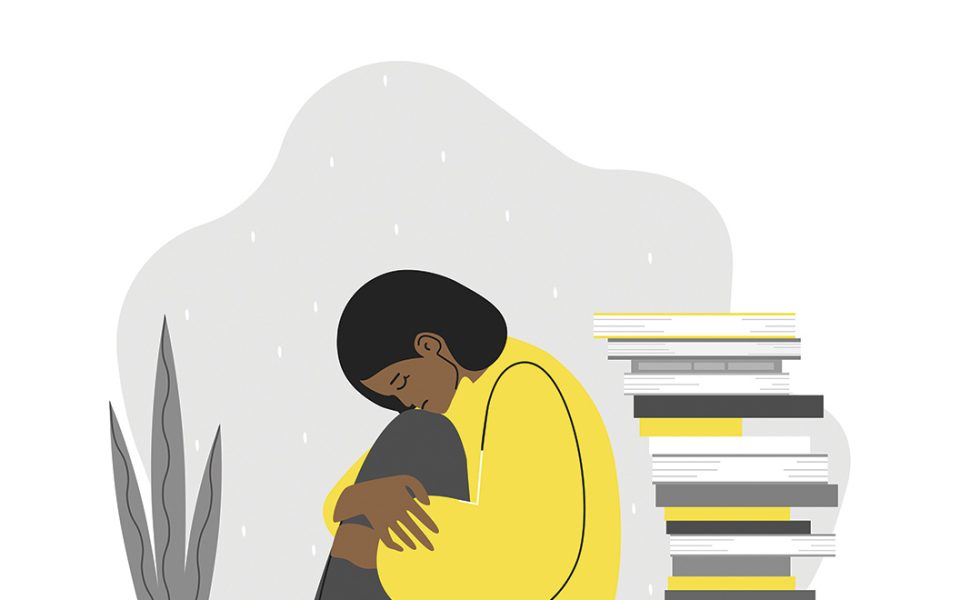As the COVID-19 pandemic wore on, 14-year-old Riley Cassell’s biggest fear became not the virus, but that one of his good friends would die by suicide.
Riley’s friend had been dealing with depression for a long time, since before the pandemic. Though the friend had previously been able to talk to their parents, the pandemic has put a strain on that relationship so that they did not feel comfortable speaking up at home, Riley told TCB.
Because of this, Riley found himself talking to their friend online often, but was unable to provide extra support in person because of the pandemic. Every time he logged off the computer, he worried his friend wouldn’t be there when he came back. The friend has since gotten help.
Despite the stress that young people have been under, Riley says he has found little empathy from the staff at Mendenhall Middle School, where he went to school for the last year and a half. His teachers have been giving out zeroes for any late work.
“Some days it’s so bad I don’t want to get out of bed, and then some days I’m fine,” he said. “Lots of my friends are going through the same thing, if not worse.”
The only communication he remembers seeing from the school was a single email letting students know there are guidance counselors available. Riley, who heads to Page High School this year, does not think this is enough.
“It’s been awful,” he said. “There’s no connection with friends. I’ve had to stop so many sports and activities.”
Allyn Cassell, Riley’s 12-year-old sibling, has felt much of the same anxiety during the pandemic. Allyn, who uses they/them pronouns, says mental health has become more of a struggle for them over the course of the pandemic.
“It’s been a big part of my life, especially going into middle school,” they said. “My social anxiety has gotten a lot worse because I haven’t been in these social situations.”
Also a student at Mendenhall, Allyn used to talk to people in person every day. Now, they say their social circle has narrowed. It is stressful for them to think about going back.
“It’s been hard,” they said. “I come from a family that does little screen [time], so I never really got that much friends from school’s contact information. I only really talk to two people.”

Riley, Allyn and their friends are not far out of the norm. Mental Health America found that 13.8 percent of youth ages 12-17 reported at least one major depressive episode in the last year. In North Carolina, that number is about 15 percent. Of those kids, over half did not receive mental health treatment.
Likewise, researchers with WebMD found that 46 percent of parents in a study involving 977 participants said their child showed signs of new or worsening mental health conditions since March 2020. These signs included changes in sleep, withdrawing from family and aggression.
As kids head back into schools next week, mental health professionals are encouraging teachers and parents to keep an eye on their children’s mental health.
It’s still important to pay attention to mental health
Lisa Peaty, a child and family therapist in Winston-Salem who has been practicing for 15 years, has seen similar trends.
“In Winston, there’s a good number of mental health providers and they’re all full,” she said. “Practices have had to expand. People are desperate to find mental health help.”
In her line of work, Peaty has seen many children with social anxiety, like Allyn. She says that, for some of those kids, virtual learning was almost a relief.
“But there’s this notion of therapy of a window of tolerance,” she said. “Their window has gotten a lot smaller because they’re home, so this reintegration in back to school, this is creating a lot of tension. Plus, even doing the whole online school thing and having to keep your camera on is very different than sitting in a classroom.”
Still, Peaty understands that the rising surge in cases brought upon by the Delta variant means that some kids may opt to remain virtual. During the week leading up to Aug. 5, children accounted for 15 percent of all COVID cases in the US according to research from the American Academy of Pediatrics. This marked a 4 percent increase from July 22.
And while the effects of COVID in children is yet to be known, they can still get sick and possibly suffer from long-term issues, too. Studies have found that adults who test positive for COVID later struggle with a range of symptoms, which vary but often include fatigue, shortness of breath, cough, lost of taste or smell, fever and dizziness. These symptoms can last weeks or months after the initial infection according to the Mayo Clinic.
The rising cases among children is something school districts in Forsyth and Guilford counties are taking very seriously. Recently, both reinstated mask mandates in schools just a few weeks after the CDC recommended people to start wearing masks indoors again, regardless of vaccination status.
According to WFMY News, in Forsyth County the school board approved a mask mandate for students, staff and visitors ages 5 and older and plan to reassess this after 10 weeks. Mayor Allen Joines recently reinstated a city-wide mask mandate for Winston-Salem.
Guilford’s school board also voted 6-2 to make masks mandatory in schools, require regular COVID testing for unvaccinated student athletes, coaches and those who participate in other high-risk activities such as chorus or marching band. This is consistent with Guilford County’s decision to reinstitute a mask mandate for all indoor locations. Durham County, Orange County and the town of Boone have all reinstated similar mandates.
As kids start to go back to school in person, John Plonski, director of IMAlive Network, says adults need to be on the lookout for mental health changes regarding the kids in their lives. IMAlive is the first virtual crisis center designed for those who might be afraid to reach out for help with a phone call. They serve cities nationwide, including Greensboro, High Point and Winston-Salem.
“In an ideal world, every school would have a bunch of school counselors and nurses and officials who would have their fingers on the pulse of how kids are doing,” said Plonski. “But mental health isn’t necessarily a high priority for schools.
“What teachers can do is be aware of warning signs,” he continued. “Look for changes. It can be a gradual change, such as a student who in the past was outgoing and is now moody and morose. Don’t chalk it up to kids being kids. Don’t discount them.”
Echoing what Plonski said, therapist Lisa Peaty noted that the most important thing is to practice patience with kids and students who might exhibit behavioral changes.
“This is a marathon, not a sprint,” Peaty said. “We need to keep our kids physically healthy, but we also can’t ignore their mental health.”
Plonski has done work in disaster response and says that while things will get back to a new normal eventually, that does not mean everyone will be ok immediately, that kids will still struggle to readjust after such a traumatic event.
“The reality is, we need to keep our eyes and ears open as time goes on,” Plonski said. “Just like adults are dealing with a new normal, so are young people. They’re going to have various reactions to it. Some are going to adapt well, some less and some not at all. But the big thing is to keep an open dialogue.”
For more about mental health in schools, visit here. To learn about how teachers are coping with returning to classrooms, read our article here.
Learn more about Guilford County Schools’ mental health support for students at gcsnc.com/Page/26779. For Winston-Salem/Forsyth County Schools, visit wsfcs.k12.nc.us/Page/785.
Join the First Amendment Society, a membership that goes directly to funding TCB‘s newsroom.
We believe that reporting can save the world.
The TCB First Amendment Society recognizes the vital role of a free, unfettered press with a bundling of local experiences designed to build community, and unique engagements with our newsroom that will help you understand, and shape, local journalism’s critical role in uplifting the people in our cities.
All revenue goes directly into the newsroom as reporters’ salaries and freelance commissions.


Leave a Reply